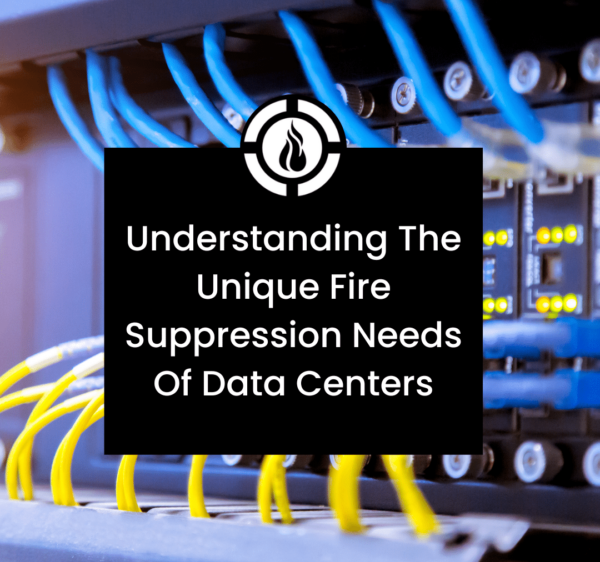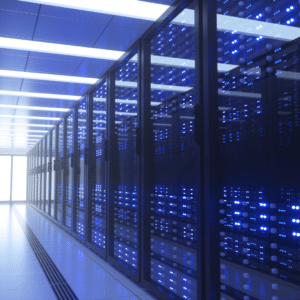Ensuring the safety of your business’s data begins with effective fire suppression. Our Tampa data center fire suppression team excels in understanding data centers’ unique fire safety needs.
Do you want the good news or the bad news?
The good news is that data center fires are rare. In the last ten years, there have been only 22 significant data center fires, and only nine were in the United States.
The bad news is that a fire in a data center can cause physical damage and significant downtime. This downtime, often lasting hours, can result in costly losses ranging from $250,000 to over $500,000 per hour of outage. This underscores the substantial economic impact of fires on data center operations.
Why Are Data Center Fires So Costly?
Data centers are essential hubs for your business, storing crucial information and equipment. When a fire strikes, the potential loss of sensitive data, customer trust, and market reputation can hit hard financially.
Mitigating the fire risk in your data center takes professional Tampa data center fire suppression specialists (like ours!) who understand how data centers differ from other facilities in their fire protection needs.
How Do Data Centers Differ From Other Facilities For Fire Protection?
Four key elements are needed to start a fire: fuel, heat, oxygen, and the chemical reaction called combustion. All four elements are present in a data center due to the abundance of electrical equipment and sensitive materials. Therefore, robust fire prevention and suppression systems are essential to protect the facility and its operations.
Data centers’ unique fire suppression needs typically revolve around protecting sensitive equipment and valuable data while minimizing downtime. Some key considerations include:
- Quick detection: Data centers require early detection systems to identify potential fire threats before escalating quickly.
- Minimize water damage: Traditional water-based sprinkler systems may not be suitable for data centers due to the risk of water damage to sensitive equipment. Alternative suppression methods like clean agent or inert gas systems are often preferred.
- Maintaining airflow: Data centers rely heavily on airflow for cooling systems and equipment operations. Fire suppression systems must be designed to minimize disruption to airflow while effectively suppressing fires.
- Protecting against electrical fires: Data centers house numerous electrical components, increasing the risk of electrical fires. Fire suppression systems should be designed to address these specific hazards.
- Compliance with regulations: Data centers must comply with industry-specific regulations and standards governing fire protection and suppression systems.
How To Address Fire Protection in Data Centers
Our Tampa data center fire suppression technicians know that the best fire protection solutions for data centers typically involve a combination of advanced technologies and strategic planning to mitigate risks effectively.
Some critical solutions include:
- Early detection systems: Implementing advanced fire detection systems such as smoke detectors, heat sensors, and flame detectors can provide early warnings of potential fire incidents, allowing for quick response and minimizing damage.
- Specialized suppression systems: Utilizing specialized fire suppression systems tailored to the unique needs of data centers is crucial. This may include clean agent suppression systems, inert gas systems, or water mist systems designed to suppress fires quickly and effectively while minimizing damage to sensitive equipment.
- Compartmentalization and containment: Designing data center layouts with compartmentalization and containment measures can help prevent the spread of fire and smoke, limiting damage to specific areas and reducing the risk of widespread disruptions.
- Regular maintenance and testing: Regular maintenance, inspection, and testing of fire protection systems are essential to ensure their effectiveness. This includes testing detection systems, inspecting suppression equipment, and verifying compliance with industry standards and regulations.
- Emergency response planning: Developing comprehensive plans tailored to data center environments is critical. This includes establishing evacuation procedures, training staff on fire safety protocols, and coordinating with local emergency services for swift response during a fire.
By implementing these fire protection solutions and following best practices, your data center can enhance its resilience against fire-related risks and safeguard critical operations and assets.
DynaFire Understands The Unique Fire Suppression Needs Of Your Data Center
Data centers have come a long way in the 20 years we’ve served Central Florida businesses. Our Tampa data center fire suppression team knows the most effective ways to mitigate your fire risk and, if needed, put out a fire with minimal damage to your critical infrastructure. Contact us today to see how our fire suppression solutions can work for your business.







